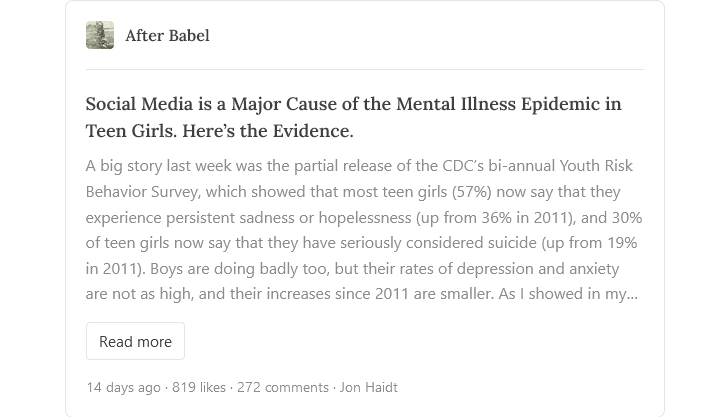Freddie deBoer is convinced that much of the reason for widespread depression among teenagers can be traced directly to their obsessive devotion to the online world through their smartphones:
Are smartphones to blame for the mental health crisis among teens? The debate has picked up steam lately, in part because of the steady accumulation of evidence that they are indeed, at least partially. (As you know, I’m a believer.) Jonathan Haidt has done considerable work marshaling this evidence. But there’s an attendant question of how phones make kids miserable, if indeed they do. In this post I offer some plausible answers. This is mostly just speculation and I don’t know if the proffered explanations can be tested empirically.
I want to start by establishing a sort of meta-layer on which a lot of these problems rest. We might be inclined to say that these problems are inherently problems of the internet/online life/digital culture, rather than smartphones as such; you can be hurt by what I’m going to describe from a laptop as well as from a smartphone. And I think that’s right, except for one key difference: ubiquity. No matter how portable and light it is, you’re not reflexively checking your laptop on the subway platform or in the bathroom. The iPhone took all of the various pathologies of the internet, made it possible for them to be experienced repetitively and at zero cost morning and night, and dramatically scaled up the financial incentives for companies to exploit those pathologies for gain. You can certainly have an unhealthy relationship with the internet when it’s confined to your desktop. But phones make relentless conditioning and reflexive engagement a mass phenomenon.
The other overriding factor here is the fact that adolescents are still developing mentally, and thus are likely more susceptible to these problems.
Constant exposure to unachievable conditions. Back in my youth, you might watch an MTV show about how rich people lived, or leaf through a magazine like US Weekly, and be exposed to opulence and material excess. Or you might go on vacation and see how the other half lives if you took a tour of the Hollywood hills or whatever. You were perfectly well aware that rich people and their privileged lives existed. But then you turned off the show or you put down the magazine or your vacation ended, and unless you were born rich, you lived in an environment that of necessity was modest and real. Your friends might have lived in nice houses, but you didn’t see riches everywhere you looked, and your definition of what a hot girl looked like was mostly derived from the girls you went to school with. Your environment conditioned the scope of your desires.
Now, exposure to lifestyles that are completely unachievable is constant. Instagram is a machine for making you feel like whatever you’ve got isn’t enough. (That’s how it functions financially, through advertising idealized lives.) There are young people out there who have arranged their various feeds such that they’re always a few seconds away from seeing concerts they can’t attend, cars they can’t drive, houses they can’t live in, clothes they can’t wear, women they can’t fuck or whose bodies they can’t have, places they can’t travel to, food they can’t eat, and lives they can’t live. When I was young, if I wanted to see a picture of a Ferrari, I had to seek out a picture of a Ferrari. It was hard to see suggestive photos of intimidatingly hot women, which is why the Sports Illustrated swimsuit edition was a big deal. Mostly, the world around you was quotidian and its pleasures attainable. What can it be doing to these generations of young people, having completely unrealistic visions of what life is like being shoved into their brains all the time? How could their actual lives ever compare?
(Incidentally, I am thoroughly convinced that a majority of self-described incels are men who could find meaningful and fulfilling sexual and romantic success, both short-term and long, but who have developed such a wildly unrealistic idea about what actual human women look like that their standards are laughably high. And it’s easy to make fun of that, but I also think that the conditioning inherent to constantly looking at filtered and photoshopped pictures is powerful.)




